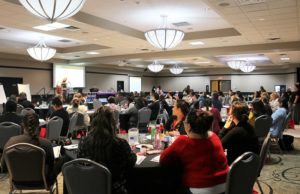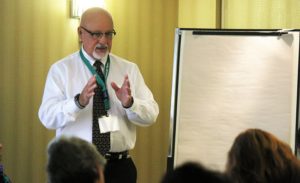Band Rep event a chance for training and information sharing

By Laura Barrios
SAULT STE. MARIE, ON—The Child Well-Being Band Representative Gathering was held earlier this month to provide information and training for band representatives, while also providing those representatives with a platform to provide input into shaping the Anishinabek Nation band representative initiatives.
“The Band Reps are the authority in the court system for our families,” stated Anishinabek Nation Grand Council Chief Glen Hare in his opening remarks. “We have a work plan for our children, where they are going to go, what is going to happen and we need to follow that plan for our children.”
The participants of the conference heard from Sinead Dearman, Associate at Olthuis, Dleer, Townshend LLP, as she delivered an update on the Canadian Human Rights Tribunal.
“Human rights are different – they are basic and fundamental and cannot be taken away,” noted Dearman.
Dearman noted that the federal government funding for child welfare has been found to be discriminatory by the Canadian Human Rights Tribunal. She explained that the federal funding programs were designed from a western view.
“It was different because it did not cover the needs of the First Nations and their view of child welfare,” she stated. “We need to raise up First Nation children to have quality of life—substantive equality.”
Participants raised concerns surrounding support for children and the discrepancy between those who live within the First Nation and those who do not that result in children not receiving adequate support because of where they resided.
“Canada cannot treat on or off-reserve children different,” she clarified. “There is a difference between children registered under the Indian Act or those about to be registered under the Indian Act, but we are working at making changes in this area.”
Leanna Farr, Legal Counsel at the Anishinabek Nation, noted that she has been working on the Canadian Human Rights Tribunal technical table, which also includes representatives from Canada, Ontario, and other Political Territorial Organizations.
“We advocate for the Child Well-Being Law and we want to exercise our jurisdiction. Prevention funding is also one of the key issues. We also have to look at the needs in prevention in each community and the required funding. It is so important to have a Band Representative in your community—they are the connection to the community and culture for the children.”
Participants were provided with the platform to give input in the development of the Anishinabek Nation Band Representative Program design. In breakout group sessions, participants discussed the maximum number of files Band Representatives should be responsible for, the dynamics of the Band Representative and families off-reserve, the implementation of customary care in their respective community, and what the duties and role of the Band Representative is for the families.
“More than 20 case files would be difficult – and even 20 is high. If the number is lower, then we can provide meaningful service to our families,” expressed one participant.
“The role of the Band Representative is understanding our community, our culture,” added another participant.
Band Representatives received an in-depth presentation on Jordan’s Principle from Amanda Mitchell, Senior Program Officer with Indigenous Services Canada. She explained the history and overview of Jordan’s Principle, individual and group funding, and opened up the floor for a question and answer session.
Examples of what is funded under Jordan’s Principle included: respite care/assisted living services; nursing services; vehicle purchase or modification; school transportation; speech therapy, physiotherapy, occupational therapy; mental health services (assessments, therapy); teacher’s aids, educational assistants, school supplies; communication devices, ceiling lifts, adaptive seats; nutritional supplements; wheelchair ramps; and Elder services.

Band Representative Gathering participants also took part in the Child Well-Being Customary Care Agreements workshop led by Ron George, Barrister and Solicitor from Kettle and Stony Point First Nation and Cynthia Trudeau, Band Representative from Sheguiandah First Nation.
“Our children are our most valuable asset. We need to invest in our children,” stated George.
That was a consistent message from various keynote speakers.
“We’re going to improve the lives of our children and youth and communities because we can—it’s our responsibility,” stated Tracey O’Donnell, legal counsel on the child well-being initiatives for the Anishinabek Nation.
“We need to continue to empower our youth. They are not our future leaders—they are our leaders of today,” noted Anishinabek Nation Head Gedzit Elder Gordon Waindubence.
“Healthy children and families are the cornerstone for healthy communities,” added Farr.
Other presentations included: Anishinabek Educational Institute First Nation Child Welfare Advocate Program Overview; Reforming First Nation Child Welfare: Canada’s Approach; Jordan’s Principle Overview; Canada’s First Nation Child and Family Services Program; Alternative Dispute Resolution; Ontario Child, Youth and Family Services Act; Ontario Children’s Lawyer; and Band Representative Court Training.


